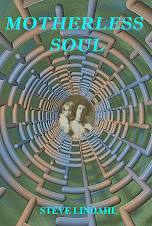Saturday, November 29, 2014
Characters who change along the way
I have just reviewed The Girl in the Blue Beret by Bobbie Ann Mason. If you would like to read the review on Amazon click here.
Many of the other reviewers of this book didn't like the main character. I've heard that type of criticism previously. Most of the members of a book club I was in a few years ago didn't like The Bean Trees by Barbara Kingsolver because they thought the main character of that novel had horrible parenting skills. I can't say this is a poor reason for disliking a book. I stopped watching The Sopranos a few years back because that show had no characters I could like. But as a writer this reaction presents a problem. Characters are only interesting if they are flawed and if they change along the way.
I was participating in a church study recently when our minister commented that all good stories have a Christ figure in them. I don't agree with that at all. I think all good stories have a Saul/Paul figure in them, someone who starts out one way and changes. The Girl in the Blue Beret certainly has that.
Saturday, November 22, 2014
Greensboro City Market 11-20-14
I had a booth at the Greensboro City Market on Thursday night. It was fun with great live music and good food (i.e., beer, pizza, and chicken nuggets). I made some contacts and ended up in the background of a television spot done by the Greensboro station -- WFMY. They were opening their annual winterfest at the same site as the City Market. But despite the two events combining, the cold weather kept the turn out small, small enough that the organizers closed the market an hour early. Still, I met some good people and had some great conversations. I like selling at these craft fairs.
Sunday, November 16, 2014
Plotting
The book I reviewed this week is Turkmen Captives. The review can be found by clicking here: Review on Amazon. Susan Williamson's novel got me thinking about plotting because her book has a very action oriented plot.
Writers I've known have a few different approaches to plotting. Some outline first, then wrap their final words around what's happening in the book. Others don't outline at all. I've found a compromise of the two approaches works best for me. If I outline everything, the result is too pat. But if I outline nothing, I wander off in dead end directions. So I start with a general idea of where I'm going, then outline specifics along the way. This way I keep on track, but still hold on to the possibility of surprise. A friend of mine (Monica Brinkman) once described an approach many writers use as a zig zag method. When her novels take her in an unexpected direction, she goes back to add the rational for the new plot elements. I suppose we all do a little of that.
The job of a writer is to use words that keep the reader's attention. Plot is as important to that goal as ideas and character development.
Saturday, November 8, 2014
Thoughts on grief
The review I wrote this morning, of An Available Man can be seen at Review on Amazon. It's the story of a man who loved his wife then lost her to cancer. It hit home for a couple of reasons. The first is that I'm the age of the main character. The second is that my wife and I have lost a number of good friends recently. I can imagine what it would be like to try to go on after losing the love of your life, but I'm quite certain I'm stronger in my imagination and the pain is weaker. Yet any kind of grief hits home. I lost my father about 15 years ago, but I still think of conversations with him and there are still times when the waves of grief encompass me. The book I reviewed is about moving forward. I think it's important to move on without losing the memories, respect and love for the people who are gone. I like novels about that process and I hope to discover more.
Saturday, November 1, 2014
Categories and labels
I just reviewed the novel Warning Signs by Sheila Englehart. Click on Goodreads to read the review.
It's a paranormal book. Reviewing it made me think about the term paranormal and how broad it is. Sheila Englehart's novel has a séance, astral projection, visits from the dead, and a horrible, dark force, known as a leech.
My own books have also been called paranormal, but all they have to earn that term is past lives.
I use past lives as a means of writing historical fiction the way time travel books do. I think labels can steer readers to what they like, but they can also give them false expectations. I think the majority of books can fit into multiple categories and I wonder how many other writers have issues with those labels.
It's a paranormal book. Reviewing it made me think about the term paranormal and how broad it is. Sheila Englehart's novel has a séance, astral projection, visits from the dead, and a horrible, dark force, known as a leech.
My own books have also been called paranormal, but all they have to earn that term is past lives.
I use past lives as a means of writing historical fiction the way time travel books do. I think labels can steer readers to what they like, but they can also give them false expectations. I think the majority of books can fit into multiple categories and I wonder how many other writers have issues with those labels.
Subscribe to:
Posts (Atom)











